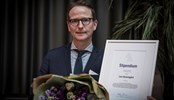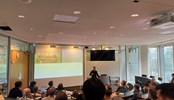"Finance for Sustainable Development" conference highlights and speakers’ presentations
Since 2011, the Stockholm Institute for Transition Economics (SITE) together with the Swedish Ministry for Foreign Affairs, has organized a yearly conference on timely topics within development policy. The conference invites scholars, policy makers and business representatives to a conversation about what current research says about challenges facing the developing world, how to translate that knowledge into action, and how broad segments of society can get involved in identifying and financing solutions. In 2011 the topic was aid effectiveness (leading up to the High Level meeting in Busan, South Korea, that year), in 2012 it was the Arab Spring. In 2013 the topic was the Post 2015 Development Agenda and in 2014 it was the role of women in development. The Development Day 2015 conference was dedicated to finance for sustainable development.
The conference started with welcome words by Anders Olofsgård, deputy director at SITE, and an opening speech by Helen Eduards, Head of the Department for Aid Management, Ministry for Foreign Affairs.
John McArthur from the Brookings Institution held the first presentation “9 Priority Financing for Development Commitments” which sparked a discussion about the current state of financing for sustainable development around the world.
Raj M. Desai from Georgetown University and the Brookings Institution gave the next talk "Private Aid and the Financing of Development". During his talk, Professor Desai presented new data on private development assistance, discussed the "California Consensus" and gave examples of crowd funding platforms such as Kiva and the Global Giving Portal.
After a short coffee break Amadou Sy from the Brookings Institution presented "Financing Africa's Sustainable Development". He focused on the common African position on the post-2015 sustainable development goals, Africa's structural economic transition and the question how to finance Africa's lingering infrastructure needs.
Theo Talbot from the Centre for Global Development gave a talk titled "Paying for Success: Catalysing Private Investment for Development". He discussed the existing instruments available for using ODA to leverage private investments and offered suggestions for how to improve on the existing portfolio of instruments.
Professor Dean Yang from the University of Michigan talked about "Migration, Remittances and Economic Development". Professor Yang covered existing evidence on the development impact of migration and remittances, as well as some evidence on how to boost the development impact of remittance flows.
After lunch, we saw the day's first panel, on the topic "A changing financial landscape: ODA, private aid and private investments". The participants; Charlotte Petri Gornitzka, Director-General at Sida, Kerstin Hessius, CEO at Tredje AP Fonden, Adis Dzebo from Stockholm Environment Institute, Anneli Rogeman, CEO at We Effect and Amadou Sy from the Brookings Institution, discussed among other things the prospects of using private institutional money to finance, developing country infrastructure, the role ODA can play in promoting that, the differing objectives of NGOs and the private commercial sector, and the importance of putting the resources to use for an ecologically and socially sustainable development process.
After that, Jolanda Profos from the OECD presented the report "States of Fragility 2015". The report introduced a new concept for thinking about states of fragility and gave an up to date presentation of the opportunities and challenges facing fragile states trying to achieve the SDGs.
The last session of the conference was a second panel on the topic "Fragile States and Remittances". Participants were Gary Milante, director at SIPRI, Annika Sundén, chief economist at Sida, Sadia Hassanen from Mångkulturellt Centrum, Kathryn Nwajiaku-Dahou, director at IDPS-OECD and Dean Yang from University of Michigan.
Torbjörn Becker, director of SITE, closed the conference expressing appreciation to all conference participants and speakers for insightful presentations and fruitful discussions. Conference topics were also debated on Twitter and Facebook so please check up these discussions using conference hashtag #DevDayFinance on Twitter. We've posted a selection of conference photos on our website and SITE's Facebook account. If you'd like to get copies of these photos, please download them from SITE's Facebook account under the Creative Commons license.
In order to make next Development Day conference even more successful we kindly ask you to fill out this short post conference survey that should take no more than 4 minutes of your time. We thank you in advance for your suggestions and comments.
Please complete the conference survey by clicking here!
On May 11 the Stockholm Institute of Transition Economics (SITE) and the Swedish Ministry for Foreign Affairs organized...
Posted by Stockholm Institute of Transition Economics on Thursday, May 14, 2015



